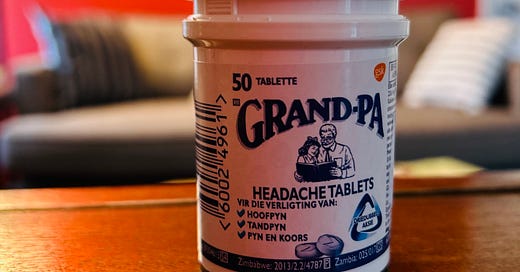Airport Headaches and the Healing Power of Nostalgia
They don’t make them like they used to - even when they do…
This past April, as my family waited in the domestic terminal of the Johannesburg airport for our flight to Hoedspruit and a safari adventure, a headache emerged.
Now there are headaches and then there are headaches. And then, somewhere beyond all headaches, are travel headaches. And I am terrified of travel headaches.
Traveling can be exhausting and difficult all on it’s own. Hurrying and waiting, hunger and dehydration. Delays bring long, languid stretches of nothingness while boarding brings on a violent, Lord of the Flies hyper-vigilance.
It can all be a lot. And a headache makes everything worse.
A headache can make those 20 minutes sitting on the plane while it fills feel like the pit of hell. The little air spigots are turned off for some reason. Someone brought a fish takeaway on board. The person next to you on the plane is already leaning on you. And why is that baby already crying?!?!
Pretty soon the headache becomes a churn in your stomach and you’re sweating, have chills, and are trying not to be so obvious as you check if the seatback in front of you has a puke bag.
(Why is my pulse elevated? Let’s all just take a deep breath.)
So back in the South African airport, I went to grab some headache medicine to kill my travel headache before it started and immediately ran across an old friend.
Grand-Pa Headache Tablets.
Grand-Pa tablets are essentially analogous to Excedrin Migraine in the US - a delightful combination of acetaminophen (paracetamol overseas), ibuprofen, and caffeine. Still, Grand-Pa exists in a category of its own.
As a missionary in 2004, I was beyond thrilled to have these tablets. They were like a miracle drug. And even then, they were widely considered something of a throwback to a bygone era. The artwork on the bottle was obviously outdated. The Afrikaans label was aimed at a white-dominated country that hadn’t existed for years. And, yet, when I told Africans that I had taken Grand-Pa tablets, they all responded the same way - with a wry smile as if I’d taken cocaine and a response along the lines of “that’ll make anything feel better.”
I wondered if there was a secret ingredient I was missing.
There wasn’t. They were just effective pain meds in a land with more ineffective treatments - mysterious tinctures and witch-doctor remedies - than you can possibly imagine.
So finding them in 2023 was like winning the nostalgia lottery and the pain-relief lottery all at once.
They were unchanged from 2004. And, in 2004, they were unchanged from 1982.
Same formula. Same outdated grandfather reading a book to his 1920’s granddaughter on the label.
And I was thrilled to be holding them.
This, mind you, is counterintuitive. Medicine is one area where advances are perhaps most welcome. Things are always getting more effective. Just 100 years ago, doctors were prescribing Coca-Cola for upset stomach, unwittingly adding carbonated acid to ulcers and Crohn’s disease and every other gastrointestinal malady.
But Grand-Pa had worked in the past. And headaches are still headaches.
And something in that memory of the effectiveness of Grand-Pa upon me as a starving 24 year-old started healing the headache before the bottle was ever opened, before the first tablet met my mouth.
Almost like nostalgia has power, like remembrance can heal.
With coffee, studies have shown that your dopamine and serotonin levels elevate before you take your first sip, which implies that your anticipated consumption is enough to trigger the chemical magic in your body. The same is true for sex and all pleasure-seeking in general. It is not the act of pleasure that marks the greatest chemical release but the anticipation of it.
Like sports fans rising to their feet before the thunderous breakaway dunk or prior to the ball-carrier crossing the goal line, it’s as if our brain knows what is about to happen and proactively starts to celebrate. It would only make sense that our bodies start the chemical touchdown dance before the player enters the end zone.
So here’s my theory.
If you’d given me some other, unfamiliar brand of headache tablets (with an identical formula) in the airport that day, they’d have worked just fine. But they wouldn’t have worked so well or so quickly. Because the healing power of nostalgia was in play. My brain knew what was coming and the chemical touchdown dance ensued from the moment the bottle of tablets was in my possession.
This would explain why there might actually be a sliver of truth in the “they don’t make them like they used to” mumbled by curmudgeons everywhere.
Maybe it’s why people hated New Coke and vastly preferred Coca-Cola Classic or why so many sentences start with the phrase “back in my day.” There is, somehow, an anticipatory power in what we have experienced in the past.
Perhaps this might enlighten us as to why the Bible consistently encourages remembrance and why Jewish festivals center around every kind of communal remembrance.
Familiarity. Remembrance. Nostalgia.
Power.
Remembrance is activated nostalgia. And, whether we’re dealing with an airport headache or faith doubts, there is something in the knowledge that what has worked before will work again. That past effectiveness can actually be predictive of future success. Remembrance might actually have the power to heal.
- KB





